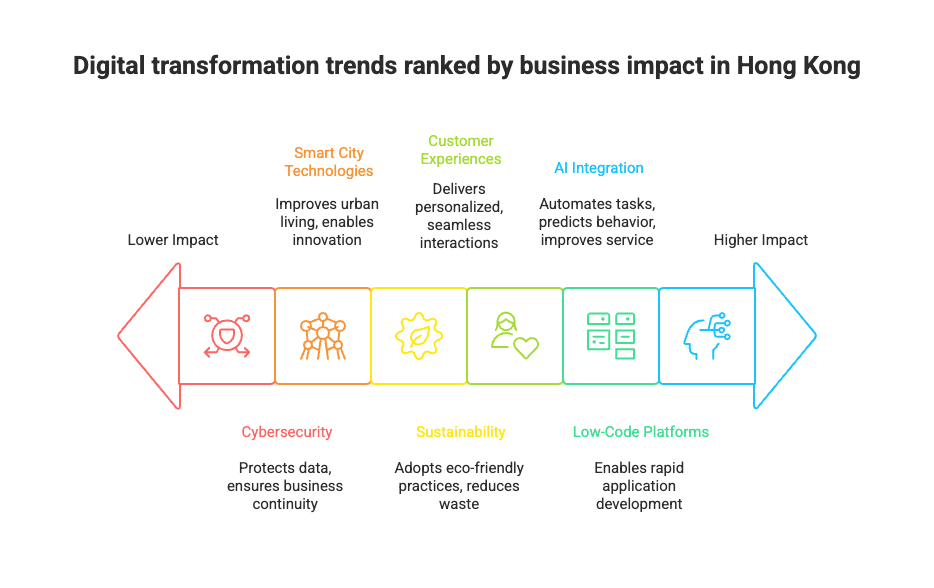Hong Kong's Digital Future: Top Transformation Trends for Businesses in 2025
In 2025, the business ecosystem in Hong Kong is undergoing a seismic shift, driven by the rapid adoption of digital transformation technologies. With its position as a global financial hub and a gateway to the Asia-Pacific region, Hong Kong is poised to lead the way in digital innovation. Businesses—particularly small and medium-sized enterprises (SMEs)—are embracing emerging technologies to stay competitive, meet rising customer expectations, and future-proof their operations.
As we look toward the future, AI integration, low-code platforms, advanced customer experiences, and sustainability-focused innovation are just a few of the top trends reshaping the region’s digital landscape. At RMD HK, we’ve worked closely with businesses across industries to navigate these transformations, helping them capitalize on new technologies while avoiding common pitfalls.
This blog explores the key digital transformation trends shaping Hong Kong’s business landscape in 2025, including actionable insights for companies looking to thrive in this new era of technological advancement.
Why Digital Transformation Matters in 2025
Before diving into the trends, let’s take a moment to understand why digital transformation is pivotal for Hong Kong businesses.
1. Rising Customer Expectations
Hong Kong’s digitally savvy consumers demand personalized, seamless, and efficient experiences. Businesses that fail to meet these expectations risk losing customers to competitors who can deliver.
2. Competitive Market Dynamics
From retail to finance, Hong Kong’s industries are highly competitive. Digital transformation allows businesses to differentiate themselves through innovation and efficiency.
3. Government Support for Innovation
The Hong Kong government’s focus on initiatives like Smart City Blueprint 2.0 and funding programs through Cyberport and HKSTP highlights its commitment to fostering digital innovation.
4. Access to Emerging Technologies
Hong Kong’s strategic location and robust infrastructure make it an ideal environment for adopting and scaling cutting-edge technologies like AI, IoT, and blockchain.
Top Digital Transformation Trends for 2025
1. Accelerated Adoption of AI and Machine Learning
Artificial intelligence (AI) and machine learning (ML) are transforming how businesses operate, make decisions, and deliver value to customers. In 2025, AI is no longer a luxury—it’s a necessity for businesses looking to stay ahead.
How AI Is Shaping Hong Kong Businesses
- Customer Service: Chatbots and AI-driven virtual assistants provide 24/7 support, reducing response times and improving customer satisfaction.
- Predictive Analytics: Businesses use AI to analyze customer behavior, enabling personalized recommendations and proactive retention strategies.
- Automation: AI automates repetitive tasks, freeing up employees to focus on higher-value activities.
Real-World Example:
A Hong Kong-based fintech firm implemented AI-driven credit scoring mechanisms to speed up loan approvals. This reduced processing times by 60%, enhancing customer satisfaction and increasing application volumes.
Actionable Insight:
Start small by introducing AI tools that address specific business needs, such as customer support or data analysis, before scaling up to more complex solutions.
2. The Rise of Low-Code and No-Code Platforms
The demand for low-code and no-code platforms is soaring, especially among SMEs that lack extensive IT resources. These platforms empower businesses to build applications quickly and cost-effectively without requiring deep technical expertise.
Why Low-Code Platforms Are Popular in Hong Kong
- Rapid Development: Businesses can launch new applications in weeks instead of months.
- Cost-Efficiency: Reduces the need for large development teams or costly external vendors.
- Scalability: Easily adapt and expand applications as business needs evolve.
Example:
A Hong Kong logistics SME used a low-code platform to develop a custom inventory management system. The project, which would have taken six months with traditional coding, was completed in under two months, saving 40% in development costs.
Actionable Insight:
Explore platforms like OutSystems, Microsoft Power Apps, or Mendix to kick-start your low-code journey.
3. Hyper-Personalized Customer Experiences
In 2025, personalization is no longer optional—it’s expected. Businesses in Hong Kong are leveraging digital tools to deliver hyper-personalized customer experiences, boosting retention and loyalty.
How Businesses Are Personalizing Experiences
- Data-Driven Insights: CRM systems and analytics tools provide a 360-degree view of customer preferences and behaviors.
- Omnichannel Engagement: Seamless integration across digital and physical touchpoints ensures consistent customer experiences.
- AI-Driven Personalization: AI tailors content, recommendations, and offers based on individual customer data.
Real-World Example:
A Hong Kong-based retail chain implemented AI-powered recommendation engines on its e-commerce platform. This resulted in a 25% increase in average order value and a significant boost in repeat purchases.
Visual Suggestion:
Include a diagram showing how customer data flows from CRM systems to AI engines to create personalized experiences across channels.
4. Sustainability-Driven Innovation
Sustainability is becoming a key focus for businesses in Hong Kong, driven by consumer demand and government initiatives. Digital transformation is enabling companies to adopt eco-friendly practices while maintaining profitability.
Examples of Sustainability-Focused Innovation
- IoT for Energy Efficiency: Smart IoT devices help businesses monitor and reduce energy consumption.
- Digital Supply Chains: Blockchain technology ensures transparency and sustainability in supply chains.
- Paperless Solutions: Cloud-based tools eliminate the need for paper, reducing waste.
Example:
A Hong Kong-based manufacturing SME adopted IoT sensors to monitor energy usage in real time, reducing energy consumption by 20% and lowering operational costs.
Actionable Insight:
Look for quick wins, such as adopting paperless workflows or using IoT devices to monitor energy usage, before scaling up sustainability efforts.
5. The Expansion of Smart City Technologies
Hong Kong’s Smart City Blueprint 2.0 is driving the adoption of smart city technologies, such as IoT, 5G, and AI, across both public and private sectors. These advancements are creating opportunities for businesses to innovate and improve urban living.
Applications of Smart City Technologies
- Smart Retail: IoT devices enable real-time inventory tracking and automated restocking.
- Transportation: AI-driven logistics platforms optimize delivery routes, reducing costs and emissions.
- Healthcare: Telemedicine and AI-powered diagnostic tools are improving access to healthcare services.
Real-World Example:
A Hong Kong logistics company used IoT and AI to optimize delivery routes, reducing fuel consumption by 15% and improving delivery times.
6. Cybersecurity as a Priority
As businesses adopt more digital technologies, the risk of cyberattacks increases. In 2025, cybersecurity is a top priority for Hong Kong businesses, especially those handling sensitive customer data.
Key Cybersecurity Trends
- AI-Powered Threat Detection: AI identifies and mitigates threats in real time.
- Zero Trust Frameworks: Ensures strict access controls across networks.
- Cloud Security: Protects data stored on cloud platforms from breaches.
Actionable Insight:
Invest in comprehensive cybersecurity solutions, including endpoint protection, firewalls, and employee training, to reduce vulnerabilities.
How Hong Kong SMEs Can Stay Ahead
1. Leverage Government Initiatives
Take advantage of funding and support programs, such as those offered by Cyberport and Hong Kong Science Park, to adopt new technologies.
2. Partner with Specialized Agencies
Collaborating with a digital transformation agency like RMD HK can help you navigate complexities, choose the right tools, and implement strategies effectively.
3. Embrace Continuous Learning
Encourage employees to stay updated on emerging technologies through training programs and workshops.
FAQs: Digital Transformation Trends in Hong Kong
1. What is the biggest digital transformation trend for Hong Kong businesses in 2025?
AI integration and low-code platforms are among the most impactful trends, enabling businesses to innovate quickly and cost-effectively.
2. How can Hong Kong SMEs afford digital transformation?
Government funding, such as Cyberport Incubation Programs, and cost-effective tools like low-code platforms make digital transformation accessible to SMEs.
3. How does digital transformation enhance customer experiences?
By leveraging AI, data analytics, and omnichannel platforms, businesses can deliver personalized, seamless, and engaging customer interactions.
Why Partner with RMD HK?
At RMD HK, we specialize in helping Hong Kong businesses navigate digital transformation with confidence. From low-code development to AI implementation, our tailored solutions are designed to future-proof your business while maximizing ROI.
What We Offer:
- Expert Guidance: In-depth knowledge of Hong Kong’s business ecosystem.
- Cutting-Edge Solutions: Expertise in emerging technologies like AI and low-code platforms.
- End-to-End Support: From strategy development to implementation and optimization.
Final Thoughts
Hong Kong’s digital future is filled with opportunities for businesses willing to embrace change and innovation. By staying ahead of trends like AI, low-code platforms, and sustainability-driven innovation, SMEs and enterprises alike can thrive in a competitive market.
At RMD HK, we’re committed to helping businesses in Hong Kong and the Asia-Pacific region harness the power of digital transformation. Whether you’re just starting your journey or looking to scale existing efforts, our expertise ensures your success in 2025 and beyond.



.png)
